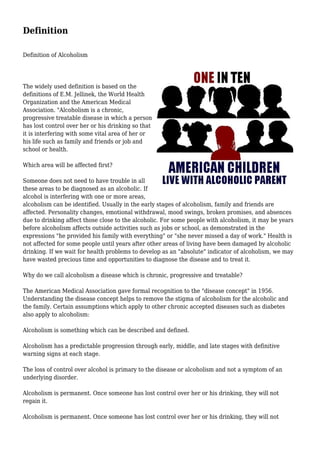
Definition
- 1. Definition Definition of Alcoholism The widely used definition is based on the definitions of E.M. Jellinek, the World Health Organization and the American Medical Association. "Alcoholism is a chronic, progressive treatable disease in which a person has lost control over her or his drinking so that it is interfering with some vital area of her or his life such as family and friends or job and school or health. Which area will be affected first? Someone does not need to have trouble in all these areas to be diagnosed as an alcoholic. If alcohol is interfering with one or more areas, alcoholism can be identified. Usually in the early stages of alcoholism, family and friends are affected. Personality changes, emotional withdrawal, mood swings, broken promises, and absences due to drinking affect those close to the alcoholic. For some people with alcoholism, it may be years before alcoholism affects outside activities such as jobs or school, as demonstrated in the expressions "he provided his family with everything" or "she never missed a day of work." Health is not affected for some people until years after other areas of living have been damaged by alcoholic drinking. If we wait for health problems to develop as an "absolute" indicator of alcoholism, we may have wasted precious time and opportunities to diagnose the disease and to treat it. Why do we call alcoholism a disease which is chronic, progressive and treatable? The American Medical Association gave formal recognition to the "disease concept" in 1956. Understanding the disease concept helps to remove the stigma of alcoholism for the alcoholic and the family. Certain assumptions which apply to other chronic accepted diseases such as diabetes also apply to alcoholism: Alcoholism is something which can be described and defined. Alcoholism has a predictable progression through early, middle, and late stages with definitive warning signs at each stage. The loss of control over alcohol is primary to the disease or alcoholism and not a symptom of an underlying disorder. Alcoholism is permanent. Once someone has lost control over her or his drinking, they will not regain it. Alcoholism is permanent. Once someone has lost control over her or his drinking, they will not
- 2. regain it. Alcoholism is terminal. Alcohol is directly or indirectly the cause of death for most alcoholics who do not seek treatment. Alcoholism is treatable. Total abstinence from alcohol is the necessary first step in the treatment of alcoholism. For most alcoholics, long-term outside support is essential for a lifetime of recovery. Does "loss of control" mean that someone drinks every day or gets drunk every time they drink? Drinking patterns vary depending on life circumstances and on the progression of the disease. The key to understanding "loss of control" is the inability of the alcoholic to predict what will happen when he or she does drink. For some people this may mean controlled social drinking interspersed with episodes of drunkenness and for others daily, compulsive drinking and getting drunk. It is losing the power of choice over what will happen after taking the first drink that is at the heart of "loss of control over alcohol." Why is physical addiction not part of this definition? Only a small percentage of the total population of alcoholics at any given time (12% or 14%) are physically addicted to alcohol. The definition is based upon the consequences of someone's drinking, not on whether someone is physically addicted. Alcoholism/Medical Model (Boston Globe 4/9/96) While biology certainly plays a role in addiction, it isn't the whole or even most of the story. The social and environmental factors behind why people drink or take drugs, as well as their beliefs about how their drug of choice helps them, are just as critical in understanding and treating addictions. "Biobehavioral" framework therapists explore why people like to drink and try to set up a gradual process of change that requires the alcoholic to take responsibility for their behavior. The model says that the alcoholic is responsible for recovery, but not necessarily responsible for the cause of their addiction. Instead of confronting problem drinkers and telling them they must quit "or else," the new biobehavioral approach is based on the realization that drinking or taking drugs gives addicts something they may not want to give up. https://www.mtholyoke.edu/health/definition_of_alcoholism